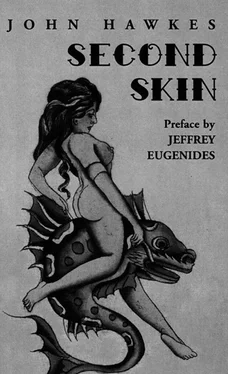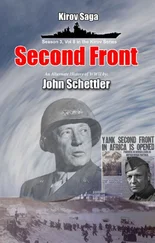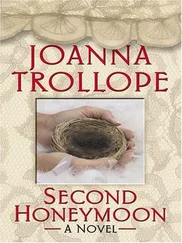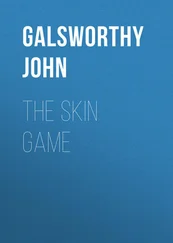“So here you are!”
It was deep, low, husky, strong, the melodic tough voice of the woman who always sounds like a woman, yet talks like a man. It was close to me, deep and tempting and jocular, and I thought I could feel that enormous mouth pressed tight to my ear. It sounded like a big throat, shrewd powerful mind, heart as big as a barrel. And I was right, so terribly right. Except for the heart. Her black heart.
“My God. What are you doing down there?”
Somehow I opened my eyes, looked over my shoulder and raised my eyes from bright pink heart-shaped shell to bunches of weed to jutting hump of the shore to rising tall figure of the woman standing wind-blown on the edge above me. Looked and fought for breath.
Slacks. Canary yellow slacks. Soft thick canary yellow slacks tight at the ankles, cut off with a cleaver at the bare white ankles, and binding the long thighs, binding and so tight on the hips — yellow smooth complicated block of flesh and bone — that she could force only the tips of her long fingers into the slits of of the thin-lipped and slanted pockets. Slacks and square white jaw and great nest of black hair strapped in an emerald kerchief. Great white turtle-neck sweater and trussed white bosom, white breast begging for shields. Shoulders curving and muscular, unbowed. But yellow, yellow from the waist down, the tall easy stance of a woman proud of her stomach — lovely specimen of broad flat stomach bound and yellow and undulating down the front of the slacks — and staring at me with legs apart and elbows bent and eyes like great dark pits of recognition in the bony face. A strand of the black hair came loose and there was a long thick silver streak in it.
“Water’s about twenty degrees,” she said, and I heard the deep voice, saw the mountain of frosty breath, the toss of the hair. “You look like a damn seal. People shoot seals around here.” And with one canary stride she was gone.
“Wait,” I called, “wait a minute! ” But she was gone. And of course when I looked again there was no bird in the sky and no poor white dead thing lying between myself and the blind tower on the rock. So I flung myself up the hump of the shore, knelt for a moment and carefully ran my fingers over the earth where she had stood — the footprints were real, real enough the shape of her large naked foot in the crushed frozen grass — and bewildered, cold, I sped off across those empty fields as best I could; cold and sweating, I found my way back to the sleeping house.
A once-white shutter was banging, the wind was whistling down the halyards of the clothesline, the nose of the hot rod peered at me through the tall grass, all was quiet around the kennel, and the house was sleeping, was only an old wooden structure with a tin mailbox on a post by the gate and crusts thrown out for the birds. Nothing more peaceful than the cord of cherry-wood— ash, spruce, hemlock, whatever it was — piled up for the dogs to foul. But I walked with the woman in my eye, entered the house with the vision of her handsome white face before me. Striking magic. Bold hostility. And I had begun now to suspect that sleeping house and I began to raise a first faint guard in my own defense, approaching the lopsided back storm door with care. But I was too late, of course. Too late.
I entered the darkness, drove the door closed with my shoulder and stood panting and dripping and leaning against the cold rough wall of the entrance way, stood glancing at broken flowerpots, hedge clippers hung from a nail, coil of anchor chain and pile of gunny bags, stared for a moment at a half-empty sack of charcoal briquettes. The place smelled of cold earth and congealed grease, was a wooden bin for the dead leaves and rubbish of the past. Apple cider turned to vinegar. Set of moldy and rusted golf clubs flung in a corner with rakes and a pair of rubber hip boots. But nothing that I could see to fear, and I tore off the sou’wester, pulled off the coat and hung them again where I had found them. Then I put my hand on the old-fashioned glass knob, gave it a gentle turn, and stepped into the kitchen. Cold, trembling, sighing, I was glad to be home. Then I stared at the cruel mess on the kitchen table.
Bottle of Old Grand-Dad. Tall, burnished, freshly opened, bright familiar shape of every roadside bar — there was even a silver measuring device squeezed onto the neck instead of a cap or cork — that oddly professional and flagrant bottle of whiskey stood in the middle of the kitchen table, was a rude incongruous reality in the middle of the mess. And there was the mess itself: all of poor Pixie’s baby bottles, all of them, bereft of nipples, emptied, lying flat and helter-skelter on the table in little globs and pools of white baby’s milk. I walked to the sink — sides and bottom furiously splashed with the milk poured, shaken, from the bottles — I walked to the table and picked up a bottle, turned it in my hands, replaced it and picked up another, and I could make nothing of this sad vehement litter, merely stood there with my face draining, chin quivering, mouth working and twisting, trying to set itself into the shape, the smile, of my self-sacrifice.
But the nipples. The horror of the nipples. I seized each of them one by one, examined them closely and helplessly until I held five in the palm of my hand, five nipples side by side and each one neatly cut off about a quarter of an inch below the rip. Pair of steel shears spread open near the Old Grand-Dad. Bits of rubber glove made for a midget. I looked and looked and then dropped them — considerable bouncing like wounded jumping beans — and knelt on the floor, felt about under the table for the sixth nipple which I never found.
I was still on my hands and knees and thinking about the pot, the boiling water, the bottles to wash, the extra set of nipples to bring down from my drawer upstairs, thinking of the bottles I had lined up in the refrigerator — had I been watched even then? — when I heard the music. Loud music at eight o’clock in the morning in that sleeping house. I lifted my head, climbed to my feet, and slowly, more slowly than ever, I hitched a little and straightened the front of my trousers, tucked in the checkered shirt, stood listening with jaw jutting and tip of the ears red hot.
Because of course it was not ordinary music. Not that morning, not in that house. It was coming from beyond the dining room — sweet tinkle of cut glass, spindle chairs, ghosts of little old seedless ladies with chokers and gold wedding bands — was coming from the radio-phonograph in the living room. With indignation I recognized the blasting exuberant strains of that brassy music. The Horst Wessel lied in full swing, with percussion instruments and horns, trumpets and tubas, and the heavy bass voices of all those humorless young marching men. The Horst Wessel lied. I could hear the waves of praise, the smacking of the drums, the maudlin fervor, the terrible toneless racketing of the military snares, could see the muscles of the open mouths, the moody eyes locked front, could feel the rise of their preposterous love and bravery, feel the stamping feet, the floating sentiment — blue castles, beer, blood — the catching treacherous rhythm of that marching song. And I was drawn to it, drawn to it. With scowl and frown and hot wet palms, was nonetheless drawn to the impossible intensity of that barbaric unity, found myself leaving the wreck of my efforts for Pixie in the kitchen and walking toward the sound, the incredible military mass of that captured phonograph record. I reached the door, stood in the open door, and those German soldiers were singing the song of death, the song of the enemy.
Canary yellow slacks, bare feet, a man’s white shirt with open collar and sleeves rolled above the naked elbows. Oh yes, here was the second glimpse of her and she was on the floor in front of the fireplace, was kneeling and sitting back on her heels — wicked posturing, rank mystery of the triangle, bright and brazen cohesion between the rump and calves and canary yellow thighs — and her shoulders were thrown back and her powerful spine was a crescent and her broad hands were cupped on her knees. Her eyes were turned to the door and fixed on mine. No smile. Surrounded by leaves of an old newspaper. A tall glass of whiskey and a box of blue-tipped wooden matches waiting within reach on the brick apron of the fireplace. She waited and then jerked her head slightly toward the radio-phonograph, and I saw the picture of the dead soldier mounted upright in a silver frame on the cabinet.
Читать дальше












